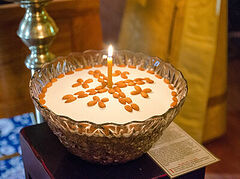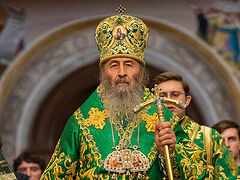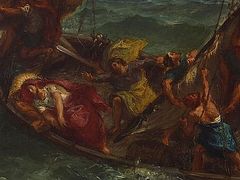I bear them witness that they have a zeal for God—but not according to knowledge. Beloved, today’s Epistle opens with these words from the Holy Apostle Paul, which he wrote in his epistle to the Romans, in the tenth chapter. In our lifetime perhaps, there has never been a time such as now when many—clergy and laity alike—have displayed such a zeal not according to knowledge. They have also ignored the Apostles’ words—Brethren, to your faith add knowledge. At no time before have witnessed such ridiculous conspiracy theories as those regarding COVID-19; but we are also seeing strange theories that touch on deeper, eschatological questions. I will tell you why I personally disregard these many theories: There are too many parties (both political and ecclesial) with various agendas, most of which oppose and contradict each other. Yet, despite their many differences they seem to agree that COVID-19 is a serious illness and that precautions should be taken against it, as the medical experts recommend. This is the position of our own ecclesial authorities. My words today are not focused on this issue; the hierarchy of the Orthodox Church, regardless of jurisdiction, has spoken and continues to speak and advise that the faithful listen to the medical experts. This is my simple observation. Too many good priests and faithful I know either died of the disease or are experiencing serious chronic health issues due to it. It is in our benefit—and indeed a most serious Christian duty—to take the public’s health seriously and conscientiously.
Physical health is extremely important. We are called to preserve life, to be healthy, and to be sacrificial in our efforts to care for those around us—most especially those who are at socio-economic or physical or mental disadvantage. We are against abortion yet we say things such as COVID-19 only kills old people. This is a horrific thing for a Christian to say. My grandmother unfortunately reposed during the pandemic in hospital and she reposed alone. No one deserves to die alone; it will haunt you if your loved ones go this way, just as the big unknown of my grandmother’s final forty-eight hours haunt us. Our God became one of us—a perfect Man—and so this world is a beautiful place, and mankind is a beautiful phenomenon since God walked amongst us in the Flesh. This is the Truth of Christianity, the treasure of our whole system of belief: that the God-Man assumed our nature and died for us and arose victoriously. Now, it is possible for you and I and everyone to live eternally with and in Him. And one day in the future all generations will rise to meet Him when He returns to judge the living and the dead.
Yet the central question we ask today is: Since we live for that other, unending and external life (if I may borrow the words of the Paschal canon), do we discard the here and the now? Is it permissible to say, I await the will of God, I do not wear a mask indoors, I do not sanitize my hands (not wearing a mask and not sanitizing the hands is the new form of Christian confession against the Leviathan-of-a government set to “oppress” us)—whatever happens, happens, if I die—I die, and it’s God’s Will? I ask such people: Would you walk across the 401 with a blindfold? Surely, this is zeal not according to knowledge. We are walking confounded as if God has abandoned the Church, with many either being irresponsible with their health, and others cowing in fear or being over dramatic with their precautions, such as sheltering at home and avoiding churches (where health precautions are taken and distancing followed it is of course safe to attend), wearing a mask while driving alone, etc. There are extremes, and extremes must be avoided: I reiterate the point. Since the advent of the COVID-19 pandemic a wave of serious depression and isolation and paranoia has overtaken mankind. There is a serious breakdown in relations, within society, within families, within the Church. Quite frankly, never has society been more confused or confounded. Suicide rates are skyrocketing.
Never in our modern history have we been so close yet so also so alone. What is the solution?
Fortunately for us, we heard about two men who, like us, were confounded and confused—though in somewhat different circumstances. After Jesus Rose in triumph from the Dead, two Apostles, Luke and Cleopas, walked to Emmaus in utter confusion and anguish. Those of you who regularly attend Sunday Matins may even know the Sunday Gospel readings by heart, since there are eleven and they function on a rotation. This is the fifth in the cycle, and perhaps the longest. The two Apostles are frightened and confused. They discuss amongst themselves the events of Christ’s Passion, and Jesus approaches them in secret and asks them: Why are you sad?
What do they say to the Lord? Have you not heard the evil events of the past days!? The Lord replies almost ironically, with what things? Cleopas explains, The things concerning Jesus of Nazareth, who was a Prophet mighty in deed and word before God and all the people, and how the chief priests and our rulers delivered Him to be condemned to death, and crucified Him. But we were hoping that it was He who was going to redeem Israel. Indeed, besides all this, today is the third day since these things happened.
The Lord’s reply echoes through the Gospel to us, in 2021. O foolish ones, and slow of heart to believe in all that the prophets have spoken! Ought not the Christ to have suffered these things and to enter into His glory? Foolish ones and slow of heart to believe! We have seen no remarkable improvement since those times. Our overall behavior in this pandemic—either being totally reckless by ignoring health measures in Churches out of a sense of invincibility, or out of the mistaken idea that illness does not spread in Church (for the record: People have, of course, even died in Churches, historically) on the one hand, and, on the other, shutting churches down out of paranoia, forbidding the veneration of icons (COVID-19 is not transmitted via surfaces according to the authorities) etc., are all results of one central problem: our foolishness and lack of faith and slowness of heart.
The Lord sat with Luke and Cleopas at Emmaus. He sojourned with them on the way, He opened the Scriptures, their hearts were aflame! They do not recognize who it is still; Jesus is so familiar yet so unfamiliar. Abide with us, they pray Him, it is toward evening and the day is far-spent. While we ignore mask rules out of a sense of defiance in Church, while we slander those who have different opinions from ours in regards to the pressing issues of our day, or when we put signs above the icons that say, do not kiss—do we not realize: The day is far spent? Each person can answer this for his or herself. The Lord stayed with the Apostles. He broke bread with them and imparted life to them in the breaking of the bread, and this is how He was recognized—and then He vanished. Perhaps when we recognize that God has visited our loneliness, perhaps then it will be too late.
And we too will repeat the words of Luke and Cleopas: Did not our heart burn within us while He talked with us on the road, and while He opened the Scriptures to us? I would like us to now contrast this warmth, this living Faith, with the faithlessness shown today by the people of a distant Galilean town, that of the Gergesenes. The residents of this town were terrible Jews; they disregarded the law of Moses, they grew and ate swine. They were faithless. And Jesus visited them, as we heard in today’s Gospel at the Liturgy, from the eighth chapter of Matthew, beginning at the verse 28. These people, like us, were vexed with a problem that would not leave them: Two demoniacs, that is, two men possessed by demons, roamed those places and inhibited the normal life of the region. Christ provided the solution to their chronic problem by permitting the demons to leave the men and enter the herd of swine, which ran down a cliff and into the Sea of Galilee. Christ’s visitation and presence comes at a cost. And sometimes this cost, seemingly, cuts into our plans and endeavors. And sometimes, as is the case in today’s Gospel, those benefited by Christ remember the swine and the profit which came from the swine and they repeat to Christ the words of the Gergesenes, which in essence, are two words: Get out.
Notice the distinct contrast between the two Apostles in the Matins Gospel and the Gergesenes at the Liturgy’s Gospel: The Apostles heart is warmed at the Lord’s presence, while the Gergesenes say to the Lord, Leave now, get out! Perhaps we also partake in this faithlessness; and if we do, spare us, Lord! It is easy to be caught up in the debates and controversies of the age and to dogmatize them. Christians are called to be men and women of balance, and moderate concerning the things (and also in the opinions) of this world. Extremism and fanaticism are never healthy qualities. There are extremes on each side of the COVID debate, which should be avoided. Whatever we do in our time, the following Tolkien words from the Fellowship of the Ring should resonate within our conscious: “I wish it need not have happened in my time, and so do all who live to see such times. But that is not for them to decide. All we have to decide is what to do with the time that is given us.”
Time is given to us. This life is a gift by Christ. And the time we have is a gift which should not be recklessly discarded under the pretext that God’s Will is a mechanical construction. Our Church is not Calvinism. If God added years to Hesechia’s life, He may also do so to yours—if you repent, and if you care and sacrifice for others. And caring for others means that you, yourself, are healthy: mentally, spiritually, and physically. Yes, it is important to care for oneself so one may be of service to others. Take the time to reorient your life to Christ by reading His Gospel and obeying His Church. And may you be gladdened in heart and soul when He also accompanies you and walks with you in the way wherein you go.





